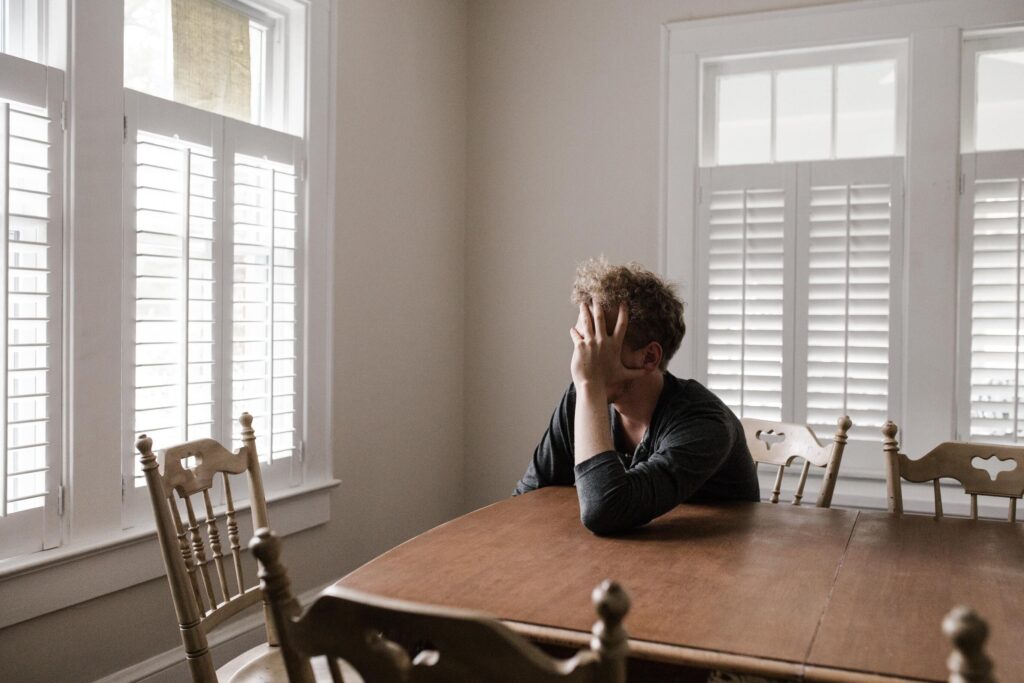Most teenagers and young adults experience a feeling of insecurity and anxiety at some point in their lives. This is perfectly normal and usually goes away as you get older. However, if these feelings persist or worsen, it may indicate a more severe problem.
Insecurity and anxiety do occur due to normal developmental processes, like trying to figure out who you are and where you fit in the world. However, many external factors can contribute to these feelings. For example, a traumatic event such as a natural disaster or assault can leave someone feeling anxious and insecure for a long time afterward.
There are many ways to deal with insecurity and anxiety. Some people find that talking about their feelings helps, while others prefer to keep their thoughts and feelings bottled up inside. Some people find relief through medication or therapy, while others find self-help books or support groups helpful.
No matter what method you choose, it is essential to remember that you are not alone. Millions of other people have struggled with the same feelings that you are experiencing. You can find help and support if you reach out for it.
You need to do away with insecurity and anxiety

The following 15 reasons are what insecurity and anxiety will influence you; I called them the bad disadvantages of insecurity and anxiety:
1. You will attract negative people into your life: Insecure and anxious people tend to attract negative people into their lives. These people may be critical, judgmental, or just generally unpleasant.
2. You will have difficulty making friends: It can be challenging to form close relationships when insecure and anxious. You may find yourself withdrawing from social situations or avoiding contact with others altogether.
3. You will have a hard time trusting people: Insecure and anxious people often don’t trust others easily. This can cause problems in personal relationships as well as professional ones.
4. You will be more likely to experience anxiety attacks: Anxiety attacks can be very frightening and can make it difficult to function normally in your everyday life.
5. You will be more likely to experience depression: Depression is a common side effect of anxiety and insecurity. It can cause you to feel hopeless, helpless, and down.
6. You will be less likely to achieve your goals: Insecurity and anxiety often lead to self-doubt and a lack of confidence. This can interfere with your ability to achieve your goals and dreams.
7. You will be more likely to overeat or engage in unhealthy behaviors: People who are insecure and anxious often turn to food or alcohol to make themselves feel better. They may also engage in risky behaviors, like drug use, gambling, or unsafe sex.
8. You will have difficulty dealing with stress: When you are insecure and anxious, even everyday stressors can feel overwhelming. This can lead to sleep, eating, and overall physical health problems.
9. You will be less likely to ask for help: Insecure and anxious people often find it difficult to ask for help. They may feel like they are not good enough or that others will judge them.
10. You will have a hard time accepting compliments: People who are insecure and anxious often find it difficult to accept compliments from others. They may doubt the sincerity of the compliment or not believe that they are worthy of it.
11. You will be more likely to ruminate over your mistakes: Insecurity and anxiety often cause people to dwell on their mistakes and shortcomings. This can lead to feelings of self-hatred and guilt.
12. You will be less likely to take risks: Insecure and anxious people often avoid taking risks for fear of failure or embarrassment. This can keep them from achieving their full potential.
13. You will have difficulty dealing with change: Insecurity and anxiety can make it difficult to cope with change. This can cause problems in both personal and professional relationships.
14. You will be more likely to experience conflict: Insecurity and anxiety often cause people to act out in anger or react defensively to perceived threats. This can lead to many heated arguments and disagreements.
15. You will have a hard time enjoying life: It can be hard to enjoy life’s simple pleasures when you are constantly worried and anxious. You may find yourself feeling tense and stressed all the time.
Doing away with insecurity and anxiety is possible, but it takes work

So, what are the causes of insecurity and anxiety among today’s teenagers and young adults? Various factors can lead to these feelings; however, we’ll be explaining 15 of the most common reasons.
1) Social Media:
Social media is one of the leading causes of insecurity and anxiety among teenagers and young adults. It has never been easier to compare yourself to others on social media. You can see what everyone is doing and how they are living their lives, making you feel like you are falling behind or not good enough.
2) Pressure to Succeed:
Another cause of insecurity and anxiety is the pressure to succeed. Teenagers and young adults are under a lot of pressure to do well in school, get into a good college, and have a successful career. This pressure can be very overwhelming and can lead to feelings of insecurity and anxiety.
3) Body Image Issues:
Body image issues are another common cause of insecurity and anxiety among teenagers and young adults. People who struggle with body image issues often feel like they are not good enough or not attractive enough. This can lead to a lot of self-doubt and insecurity.
4) Negative Self-Talk:
Negative self-talk is another common cause of insecurity and anxiety. This is when you say negative things to yourself regularly. For example, “I’m not good enough,” or “I can’t do anything right.” This can be very damaging and can lead to insecurity and anxiety.
5) Childhood Trauma:
Childhood trauma is another common cause of insecurity and anxiety in teenagers and young adults. This is any traumatic event during childhood, like physical or sexual abuse. These events can leave people feeling scared and insecure for a long time afterward.
6) Relationship Problems:
Relationship problems are also a major cause of insecurity and anxiety among teenagers and young adults. This can be anything from fights with your parents to breaking up with your boyfriend or girlfriend. When you are going through a tough time in your relationship, it can be tough not to feel insecure or anxious.
7) Peer Pressure:
Peer pressure is another common cause of insecurity and anxiety among teenagers and young adults. This is when you feel like you have to do what your friends are doing or that you have to fit in with them. This can be very stressful and can lead to feelings of insecurity and anxiety.
8) Academic Pressure:
Academic pressure is also a major cause of insecurity and anxiety among teenagers and young adults. This is the pressure to do well in school and get good grades. This can be very stressful and can lead to feelings of insecurity and anxiety.
9) Perfectionism:
Perfectionism is another common cause of insecurity and anxiety. This is when you feel like you have to do everything perfectly and that you are not good enough if you don’t. This can be very damaging and can lead to insecurity and anxiety.
10) Lack of Confidence:
Lack of confidence is also a major cause of insecurity and anxiety among teenagers and young adults. People who lack confidence often feel like they are not good enough or can’t do anything right. This can lead to a lot of self-doubt and insecurity.
11) Social Anxiety:
Social anxiety is another major cause of insecurity and anxiety. This is when you feel anxious and uncomfortable in social situations. This can be very debilitating and can lead to insecurity and anxiety.
12) Anxiety Disorders:
Anxiety disorders are the most common cause of insecurity and anxiety among teenagers and young adults. These mental disorders cause people to feel extremely anxious or scared regularly. Anxiety disorders can be very disabling and can lead to many insecurity and anxiety.
13) Depression:
Depression is also a major cause of insecurity and anxiety among teenagers and young adults. This mental illness causes people to feel sad and hopeless for an extended period. Depression can be very debilitating and can lead to insecurity and anxiety.
14) Substance Abuse:
Substance abuse is another major cause of insecurity and anxiety. This is when you use drugs or alcohol to try and cope with your problems. This can be very harmful and can lead to insecurity and anxiety.
15) Stress:
Stress is also a major cause of insecurity and anxiety. This is when you feel overwhelmed and stressed out regularly. This can be very harmful and can lead to insecurity and anxiety.
So, how can you help yourself?

If you are experiencing insecurity or anxiety, there are 15 ways to help yourself:
1) Talk to a trusted friend or family member:
Talking to someone you trust can be a great way to deal with your insecurity or anxiety. This person can listen and support you, which can be very helpful.
2) Seek professional help:
If you are experiencing severe insecurity or anxiety, it is important to seek professional help. Many qualified professionals can help you deal with these problems.
3) Exercise regularly:
Exercising regularly can be a great way to reduce stress and anxiety. It can also improve your mood and make you feel more confident.
4) Eat healthy foods:
Eating healthy foods can help improve your mood and make you feel more confident. It can also help reduce stress and anxiety.
5) Get enough sleep:
Getting enough sleep is essential for your mental health. You will be less likely to feel stressed or anxious when you are well-rested.
6) Avoid caffeine and alcohol:
Caffeine and alcohol can both increase stress and anxiety levels. It is best to avoid them if you struggle with insecurity or anxiety.
7) Practice relaxation techniques:
Many relaxation techniques can help you calm down and manage your stress and anxiety. Some of these techniques include yoga, meditation, and deep breathing exercises.
8) Set realistic goals:
When you set unrealistic goals, it can lead to frustration and insecurity. It is essential to set realistic goals to be successful and feel good about yourself.
9) Challenge your negative thoughts:
When you have negative thoughts, it can lead to insecurity and anxiety. It is important to challenge these thoughts and replace them with more positive ones.
10) Accept compliments:
When someone compliments you, accept it graciously. Please do not dismiss it or downplay it. This will help you feel more confident and secure.
11) Avoid comparison:
Comparing yourself to others is never healthy. It can lead to feelings of insecurity and inadequacy. Comparison is a waste of time and energy.
12) Make time for self-care:
Make sure you take some time for yourself every day. This can be anything from reading a book to taking a walk in nature. The important thing is that you make time for yourself and relax.
13) Practice positive self-talk:
Positively talk to yourself. When you have negative thoughts about yourself, replace them with more positive ones. This will help you feel better about yourself.
14) set boundaries:
It is important to set boundaries with the people in your life. This means you need to limit the amount of stress and negativity from others.
15) Develop a support system:
Develop a support system of people who you can rely on. These people can provide emotional support and practical help when needed.
In conclusion
Insecurity and anxiety can be very crippling conditions. However, there are many things you can do to help yourself feel better. By following the tips in this article, you can begin to manage your anxiety and insecurity. Remember, you are not alone in this. Many people understand what you are going through and want to help. Don’t be afraid to reach out for help if you need it.



